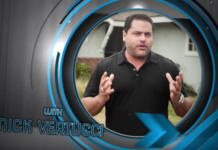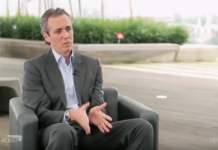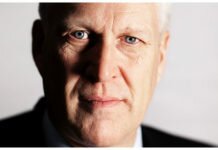A great leader can change the path of a company. Sometimes shifting the leader can improve the morale and inspire the employees to do their best. A new boss can also bring in new ideas that can set the company down a different path. Having a true leader at the helm can affect the company for many years to come. Let’s look at some of leaders–Bob Iger, Reed Hastings, Howard Schultz, and Louis Chenevert–that did not just take up the helm of their companies, but led them beyond expectations.
Bob Iger
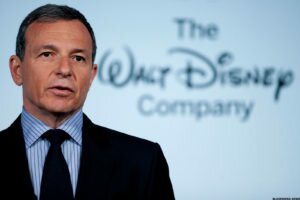 Disney is a large company with more than 140,000 employees in total. It seems nowadays that Disney owns a bit of everything. They have their own shows, movies, and theme parks, but they also have much more. Disney owns ESPN, Pixar, Lucasfilm, and Marvel Entertainment. All of this brings Disney $36 billion in annual revenue and a market capitalization of about $70 billion. Bob Iger is the chief executive officer (CEO) of the Disney Corporation, and he seems to have had a hand in many of its major acquisitions over the recent years.
Disney is a large company with more than 140,000 employees in total. It seems nowadays that Disney owns a bit of everything. They have their own shows, movies, and theme parks, but they also have much more. Disney owns ESPN, Pixar, Lucasfilm, and Marvel Entertainment. All of this brings Disney $36 billion in annual revenue and a market capitalization of about $70 billion. Bob Iger is the chief executive officer (CEO) of the Disney Corporation, and he seems to have had a hand in many of its major acquisitions over the recent years.
Iger purchased Pixar, the animation studio behind many hit films, for $7 billion. He also acquired Marvel, the stalwart comic book company and movie studio, for $4 billion. Iger is not scared to spend money if he feels the risk is worth it. He also has led the expansion of Disney into other parts of the world, like Shanghai and Hong Kong.
Next on the horizon for Iger and Disney, they will be offering their own streaming service. Previously, much of their content was available on Netflix or Hulu, but by 2019 that will no longer be the case. Disney will have a streaming service for sports and also another one for films and television shows. They have recently stated that it will be less expensive than Netflix as well. It seems the future is bright with Iger at the helm, and there is never a dull day.
Reed Hastings
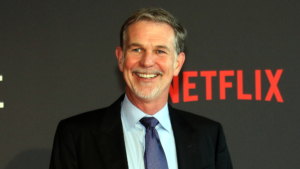 Speaking of streaming services, let’s go back to where it basically all began. Netflix began almost twenty years ago exactly. They offered a subscription service for DVD rentals. There were different packages for the subscription service, offering one, two, or three DVDs at a time. This was in direct competition with video stores across the country. Reed Hastings is the CEO and co-founder of Netflix. The story about how it all started might be a bit manufactured, about how Hastings was upset with a forty dollar late rental fee from a local video store. In any case, the dvd service through mail was a hit.
Speaking of streaming services, let’s go back to where it basically all began. Netflix began almost twenty years ago exactly. They offered a subscription service for DVD rentals. There were different packages for the subscription service, offering one, two, or three DVDs at a time. This was in direct competition with video stores across the country. Reed Hastings is the CEO and co-founder of Netflix. The story about how it all started might be a bit manufactured, about how Hastings was upset with a forty dollar late rental fee from a local video store. In any case, the dvd service through mail was a hit.
Then Hastings and Netflix took it one step further. They were one of the first streaming services as well. Mailing DVDs was no longer so consistently needed, but you could have a subscription service that would allow immediate access to certain movies right on your television. Hastings has done pretty well for himself with an estimated net worth of $2.2 billion. Now Netflix creates and offers their own movies and shows, too, without having to lease them for distribution like they do with movies from other studios. Netflix is constantly changing, and Hastings has his finger on much of it.
Howard Schultz
 Not all leaders start off in wealthy families or even look like leadership material early on in life. Howard Schultz grew up in a housing complex for the poor in New York City. He was fortunate enough to receive a football scholarship to the University of North Michigan once he graduated from high school.
Not all leaders start off in wealthy families or even look like leadership material early on in life. Howard Schultz grew up in a housing complex for the poor in New York City. He was fortunate enough to receive a football scholarship to the University of North Michigan once he graduated from high school.
Schultz was working for a Swedish drip coffee maker manufacturer when he originally became interested in the world of coffee. He wanted to open cafes and offer fancy coffees after a trip he made to Italy and saw what they were doing there. However, the company he was working for at the time, Starbucks, did not share his vision. Schultz left Starbucks and opened his own cafe after having to borrow money from friends to open it. Two years down the road, Starbucks approached Schultz about wanting to sell their retail unit to him. Fast forward years later and he is now worth about three billion dollars.
Starbucks now has about 24,000 locations nationwide. They are considered the third largest fast food chain in the world because of the number of locations that they have. They continue to rake in $20 billion in revenue. Schultz was considered a charismatic leader for the company, but on December 1, 2016, Schultz resigned as CEO of Starbucks, effective April 2017. Instead he will become executive chairman, with Kevin Johnson to become the new CEO.
Louis Chenevert
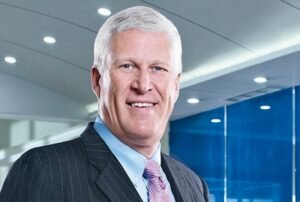 Louis Chenevert is one of those leaders that started slowly working his way up the ladder, and then he shot off like a rocket once he was recognized for his work. Chenevert worked for 15 years for General Motors in the thing he majored in during college, production management. After 15 years, he impressed his bosses enough that he became the Production General Manager there. It was his first step up into achieving leadership status.
Louis Chenevert is one of those leaders that started slowly working his way up the ladder, and then he shot off like a rocket once he was recognized for his work. Chenevert worked for 15 years for General Motors in the thing he majored in during college, production management. After 15 years, he impressed his bosses enough that he became the Production General Manager there. It was his first step up into achieving leadership status.
Louis Chenevert soon joined the aerospace manufacturer Pratt & Whitney. The company focused mainly on building aircraft engines, but at the time they were struggling. Chenevert was soon able to turn this around. After only six years there, Chenevert was hired as the new president of Pratt & Whitney.
Pratt & Whitney belonged to a much larger company known as United Technologies Corporation (UTC). UTC has its hands in many industries with both private and military contracts. Louis Chenevert made his presence known and UTC definitely took notice. By 2006, he was elected the president and CEO of UTC.
In 2014, after eight years with the company, United Technologies CEO Louis Chenevert walked away and entered into semi-retirement. His time there was well spent turning UTC’s fortunes around through his leadership abilities, which we talked about previously in this article.






